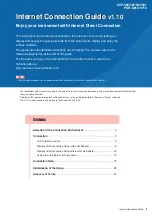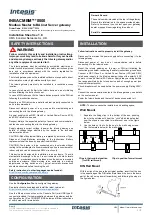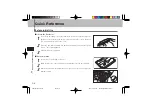
LMK2+/USB User's Guide Page 4
5. CONTROLS
The LMK2+ features the following controls and displays:
•
3-digit LED display
•
8 MENU-buttons in 2 rows of 4 buttons each
•
8 LEDs (serving as indicators for the MENU-buttons)
•
1 Wheel without spring (assignable to any Midi Controller #1..31)
•
1 spring loaded Wheel (for Pitch Bend function)
In addition LMK2+ is equipped with a monophonic After Touch sensor below the keys that is activated if you put
pressure on the keys pressed down. The activity of the wheels and the after touch sensor can be turned on or
off for each keyboard zone independently. For details see chapter 6.3.7 CONTROLLERS in this manual.
6. OPERATING AND SAFETY INSTRUCTIONS
Please follow the given instructions for use of the instrument because this will guarantee correct instrument
operation. Due to the fact that these instructions touch on Product Liability, it is absolutely imperative that they
be read carefully. Any claim for defect will be rejected if one or more of the items was observed. Disregard of
the instructions can endanger warranty.
•
The case (flight case) is not a packing suitable for shipment but the case of the instrument. If you
want to ship the instrument via mail, UPS, rail, forwarding agency or others you always must use the
original packaging. Therefore, you should keep the original packaging.
•
The instrument may only be used for the purpose described in this operating manual. Due to safety
reasons, the instrument must never be used for other purposes not described in this manual. If you are not
sure about the intended purpose of the instrument please contact an expert.
•
The instrument has to be shipped only in the original packaging. Any instruments shipped to us for return,
exchange, warranty repair, update or examination must be in their original packaging! Any other deliveries
will be rejected. Therefore, you should keep the original packaging and the technical documentation.
•
The instrument may only be operated with the voltage written on the power input on the rear panel. Before
opening the case disconnect the power plug.
•
All eventual modifications must only be carried out by a qualified person who will follow the valid safety
instructions. Every modification should becarried out only at the manufacturer or an authorized service
company. Any modification not released by the manufacturer leads to the extinction of the operation
permission.
•
With the introduction of a third person the warranty will be lost. In case of a destroyed warranty seal, any
warranty claim will be rejected.
•
The instrument must never be operated outdoors but only in dry, closed rooms. Never use the instrument in
a humid or wet environment nor near inflammables.
•
No liquids or conducting materials must get into the instrument. If this should happen the instrument must
be disconnected from power immediately and be examined, cleaned and eventually be repaired by a
qualified person.
•
Never subject the instrument to temperatures above +50
°
C or below -10
°
C. Before operation the instrument
should have a temperature of at least 10
°
C. Do not place the instrument into direct sun light. Do not install
the instrument near heat sources.
•
Keep the top side of the instrument free in order to guarantee proper ventilation, otherwise the instrument
could be overheated. Never place heavy objects on the instrument.
•
All cables connected with the instrument must be checked periodically. If there is any damage the cables
must be repaired or replaced by an authorized person.
•
Transport the instrument carefully, never let it fall or overturn. Make sure that during transport and in use the
instrument has a proper stand and does not fall, slip or turn over because persons could be injured.
•
Never use the instrument in the immediate proximity of interfering electronic devices (e.g. monitors,
computers) since this could create disturbances within the instrument and corrupt memory data.
•
The exchange of electronic parts (e.g. EPROMs for software update) is allowed only if the instrument is
disconnected from power supply.
•
When using the instrument in Germany, the appropriate VDE standards must be followed. The following
standards are of special importance: DIN VDE 0100 (Teil 300/11.85, Teil 410/11.83, Teil 481/10.87), DIN
VDE 0532 (Teil 1/03.82), DIN VDE 0550 (Teil 1/12.69), DIN VDE 0551 (05.72), DIN VDE 0551e (06.75),
DIN VDE 0700 (Teil 1/02.81, Teil 207/10.82), DIN VDE 0711 (Teil 500/10.89), DIN VDE 0860 (05.89), DIN
VDE 0869 (01.85). VDE papers can be obtained from the VDE-Verlag GmbH, Berlin.






























